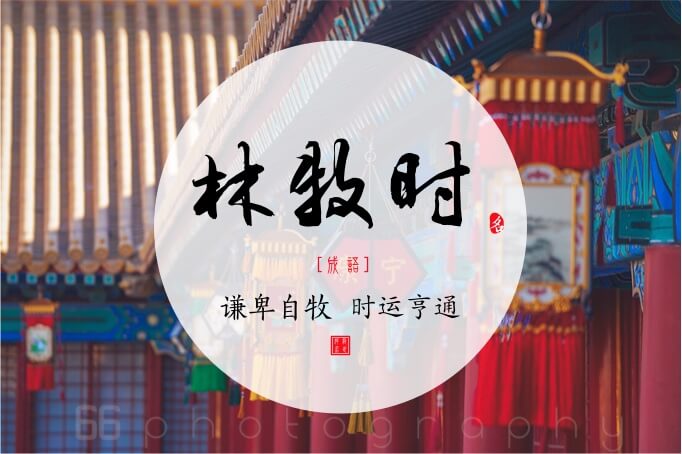Lin Mushi(林牧时) Name Analysis

Overview
-
林
Strokes:8
Pinyin:lín
Tone:2nd
-
牧
Strokes:8
Pinyin:mù
Tone:4th
-
时
Strokes:7
Pinyin:shí
Tone:2nd
- Chinese surname: 林
- Chinese given names: 牧时
- In Traditional Chinese: 林牧時
The name "Lin Mushi(林牧时)" means smooth sailing, intelligent and capable, lucky, resourceful; the impression it gives people is: harmonious, elegant, prosperous and nobiliary, fine, happiness, and kind-hearted.
Pronunciation Analysis
Tips
When choosing Chinese names, avoid words with polyphonic, double-voice (same initials), and overlapping rhymes (same finals), and pay attention to the change of pitch to achieve cadence. It is better if the consonants and vowels of the Chinese and English names are similar.
Pronunciation
"林牧时" is pronounced as: lín mù shí,The tones are: rising tone, falling tone, rising tone.
Polyphonic
There are no polyphonic Chinese characters in the name.
Double-voice and Overlapping rhymes
The pronunciation is clear, smooth and beautiful.
Homophonic
None.
Glyph Analysis
Tips
Avoiding the same structure and radicals is necessary when choosing a Chinese name. The strokes of the name should be manageable and easy to write, and the strokes should be similar and balanced.
Glyph
"林" is 8 strokes, the radical is the "木", and the left-right structure.
"牧" is 8 strokes, the radical is the "牜", and the left-right structure.
"时" is 7 strokes, the radical is the "日", and the left-right structure.
Analysis
The glyph is aesthetic, harmonious and well-proportioned.
Meaning Analysis
Tips
The word's meaning should be novel in conception and good in meaning, and it is not advisable to blindly follow the trend, not distinguish gender, indecent word meaning, or use taboo words.
Basic Meaning and Implications
牧: herd. The name implies a relaxed, free and happy life.
时: quarter (of a year); season. The name implies timing, time.
Ambiguity
None.
Name big-data
Usage and duplication rates
"林" is a common surname in China.
"牧" is a less used Chinese character for naming.
"时" is a commonly used Chinese character for naming.
The coincidence rate of the name "牧时" is less than 1 in 1,000,000, and the probability of the same name is minuscule.
The coincidence rate of the full name "林牧时" is less than 0 in 1,000,000, and the probability of the same name is minuscule.
Gender Analysis
The gender attribute is uncertain.
Related Celebrity
Tips:
To prevent the name and some famous people with the same name or the same pronunciation. In the Chinese mind, having the same name and stress as a celebrity is disrespectful. At the same time, it also loses your personality.
Contemporary Celebrity
None
Historical Celebrities
None
Analysis
The celebrity names above aren't household names, so don't worry about repeating the name or its pronunciation.
Reference
Idioms
谦卑自牧、时运亨通
Humble Self-Shepherd, Prosperous Fortune
Poems and Song Lyrics
Poetry is the essence of Chinese culture, with a long history, beautiful and romantic, and full of meaning. Chinese people like to choose Chinese names for their children from those beautiful and timeless poems, which add elegance and romance to their expectations.
御札轸西陲,龙州出牧时。
——李洞 《送龙州田使君旧诗家》
春水绿生陂,春牛出牧时。
——弘历 《题祁序江山放牧图》
樵牧时迷所,仓箱岁叠川。
——黄滔 《壶公山》
向我作牧时,客过不停轨。
——范成大 《初入湖湘怀南州诸官》
闻昔尔祖出牧时,我家大父而翁师。
——刘崧 《送焦廷璋之洪》
马侯将马识马性,如造父孙汧牧时。
——王闿运 《马将军歌》
樵牧时或逢,猿鸟遥相避。
——许南英 《鼓山纪游》
牧时宜解瑟,渴治急闻韶。
——程公许 《寿茶使三十韵》
何如在牧时,卧起玩烟景。
——楼钥 《跋卢申之所藏韦偃三马》
野花蜂蝶春游处,荒草牛羊晓牧时。
——龚诩 《马鞍山下陈氏故园》
一乘休去已忘机,恰似当初未牧时。
——宗泽 《题珣师休牧轩》
拜台樵牧时相戏,祭案牲醪久未香。
——鲁铎 《与方沙河谒张文悯墓前韵》
忆昔分符出牧时,先生欲我置曹司。
——周瑛 《吊叶文庄先生》